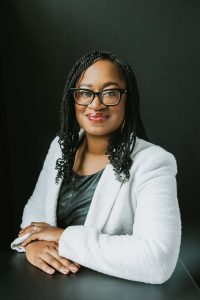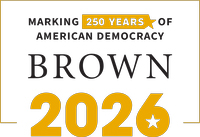E-Newsletter
Recent Posts
Latest News
-
Shirley Chisolm and American Democracy
|

Join us for an author discussion of Shirley Chisholm in Her Own Words, a new book edited by Zinga A. Fraser, the leading scholar dedicated to the study of Chisholm’s legacy.
Thursday, March 5, 2026, from noon to 1:30 p.m. in the Racial Justice Resource Center on the second floor of the Rockefeller Library. Free and open to the public.
Many Americans are familiar with Chisholm’s importance as the first Black woman in Congress and the first woman and African American to run for president with either major party. This long-overdue treatment of her work establishes Chisholm as an unparalleled public intellectual and Black feminist both in her time and now. The book not only contextualizes the Civil Rights and Black Power era, it also provides timeless insights on issues that are exceedingly relevant in our current moment. Featuring a captivating introduction by Fraser, Shirley Chisholm in Her Own Words introduces a new generation to one of the most impactful proponents of democracy in America.
Zinga A. Fraser

Dr. Zinga A. Fraser Dr. Zinga A. Fraser is an author, lecturer, historical consultant and curator. She is the Director of the Shirley Chisholm Project on Brooklyn Women’s Activism. Currently, she is an Associate Professor in the Africana Studies Department and Women’s and Gender Studies program at Brooklyn College. Dr. Fraser is a foremost expert on Shirley Chisholm and Black Congressional Women and Black feminist politics and culture. She served as the historical consultant on the Netflix feature “Shirley,” written and directed by John Ridley and starring the film’s producer, Regina King. She was the co-curator Shirley Chisholm at 100: Changing the Face of Democracy, which is the first major museum exhibition on the life and legacy of Shirley Chisholm at the Museum of the City of New York that closed in July. Dr. Fraser has published several works including her most recent book, Shirley Chisholm: In her Own Words a Collection of Speeches and Writings, which explores Chisholm’s intellectual legacy under the University of California Press, and is currently completing her book manuscript titled, Sister Insider/ Sister Outsider: Shirley Chisholm and Barbara Jordan, Black Women’s Politics in the Post- Civil Rights Era. She has appeared on local, national and international news outlets such as The New York Times, Washington Post, Time Magazine, AP Press, Essence Magazine, History Channel, Elle Magazine docuseries, Buzzfeed News, C-SPAN, The History Channel, BBC- Africa, NY1 and WNBC-TV, WABC- TV, WCBS-TV, USA Today, National Public Radio and a host of more. She is a well sought after speaker at colleges, universities, foundations and organizations.
Before entering academia, Dr. Fraser was a Legislative Assistant on Capitol Hill. Dr. Fraser has won numerous fellowships and awards from the American Association of University Women (AAUW), American Political Science Association, Columbia and Northwestern University and the Delta Research and Educational Foundation. She holds a doctorate in African American Studies from Northwestern University, and a Master’s of Arts from the Institute for Research in African American Studies at Columbia University and Undergraduate degree in Political Science and African American Studies from Temple University. Dr. Fraser abides by one of Shirley Chisholm’s most famous quotes: “Service is rent we pay for the privilege of living on this earth.”
Keisha N. Blain

Dr. Keisha N. Blain Dr. Keisha N. Blain, a 2022 Guggenheim Fellow and Class of 2022 Carnegie Fellow, is a renowned historian of the 20th century United States with broad interests and specializations in African American History, the modern African Diaspora, and Women’s and Gender Studies. She is a Professor of Africana Studies and History at Brown University and an affiliated faculty member in American Studies and in the Center for Human Rights and Humanitarian Studies.
Dr. Blain is the author and editor of eight books, including Set the World on Fire: Black Nationalist Women and the Global Struggle for Freedom (University of Pennsylvania Press, 2018), winner of the 2018 First Book Award from the Berkshire Conference of Women Historians and the 2019 Darlene Clark Hine Award from the Organization of American Historians; Until I Am Free: Fannie Lou Hamer’s Enduring Message to America (Beacon Press, 2021), finalist for the 2022 NAACP Image Award and the 2022 National Book Critics Circle Award; and (with Ibram X. Kendi) Four Hundred Souls: A Community History of African America, 1619-2019 (Penguin Random House/One World, 2021), which debuted at #1 on the New York Times Best Sellers list.
Her latest book, Without Fear: Black Women and the Making of Human Rights (W.W. Norton, 2025), was longlisted for the 2026 Andrew Carnegie Medals for Excellence. The book offers a sweeping history of human rights told through the ideas and experiences of Black women in the United States from the early nineteenth century to the present. Dr. Blain is now completing a book for W.W. Norton entitled Black Thinkers: The Global Impact of Black Intellectual Thought.
Sponsors
Sponsored by Department of Africana Studies/Rites and Reason Theatre, Department of History, Brown 2026, and the Brown University Library.

-
Pizza Pizza
|

Your Brown University Library is here for you during finals.
You’ve told us what you want, what you really really want, and it’s free pizza.
Join us on the following dates and times in three library locations for communal pizza scarfing.
Pizza Schedule
- Sunday, December 7 @ 8 p.m. at Orwig Music Library
- Tuesday, December 9 @ 9 p.m. in the lobby of the Rock
- Thursday, December 11 @ 9 p.m. in Friedman Study Center at the SciLi
Help
If what you really really want is help with finals, we have that too!
- Live chat with library experts is available Monday through Friday during regular hours.
- Check out our online subject guides and tutorials, available 24/7.
- Search BruKnow, the online library catalog, for books, special collections, journals, and databases. You have access to more through BruKnow that you have through Google Scholar!
- Primary sources / special collections can enhance most research projects and papers in all disciplines. Peruse collections, fill out the Ask Us form at library.brown.edu/hay, or email hay@brown.edu to get started.
- Want focus time with a friend or groupmates? Reserve a group study room at the Rock and SciLi.
- Need library materials not available at Brown? Borrow from a partner library.
- Overwhelmed by options? Don’t know where to start? Email rock@brown.edu for help.
Best of luck with finals!
-
John Hay Library – Broadside Collections Closed
|

Frame, Mary Juanita., “Greetings” (1950). Harris Broadsides. Brown Digital Repository. Brown University Library. https://repository.library.brown.edu/studio/item/bdr:274080/ Most of the broadside collections in the John Hay Library (including the Harris Broadsides, Rider Broadsides, Carriers’ Addresses, and general collection broadsides) will be closed to researchers December 1, 2025, to March 31, 2026. The closure does not impact access to the Lincoln Broadsides.
Many of the broadsides have been digitized and are available in the Brown Digital Repository:
Questions? Please Ask Us.
